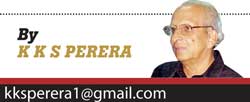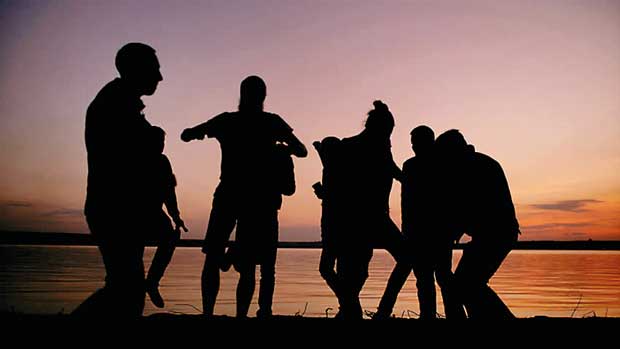Reply To:
Name - Reply Comment
 A couple of weeks ago at a religious forum, the keynote speaker who arrived late, instead of apologizing to the audience went on to comment on the behavior of ‘Campus Rascals’ who staged a demonstration in the city that led to a severe traffic jam affecting his punctuality.
A couple of weeks ago at a religious forum, the keynote speaker who arrived late, instead of apologizing to the audience went on to comment on the behavior of ‘Campus Rascals’ who staged a demonstration in the city that led to a severe traffic jam affecting his punctuality.

I have been going through several applications over the past few days forwarded to CandleAid Lanka by University students in response to their annual programme in granting scholarships to the underprivileged. CandleAid receives sponsorships through various organizations and individuals living abroad and who have personal contact with its founder, Capt. Elmo Jayawardena, the former international Airline pilot whom I met at his Annasi and Kadalagotu literary fair. When I volunteered to do some social work for the organization he requested for help in translating some of the applications forwarded to them in Sinhala.
The applicants, undergrads from all corners, Deniyaya to Galewela, Ampare to Kalawana, Anuradhapura and Polonnaruwa, North and East and many other distant places were seeking help to continue with their studies. I found among them students reading for degrees in almost all fields that included Medicine and Engineering, an exercise that gave me an opportunity to gain a comprehensive knowledge of the plight of some unbelievably distressing cases among the university student population and the lamentable plight of these unfortunate students whose families are unable to meet even part of the costs involved with their university education. Understanding the grave economic dilemma of poor families with brilliant children helped me to change my attitude towards the so called ‘Campus Rascals’. The meticulously planned mode of selection leaves not an iota of room for any unscrupulous elements to make advantage of the great service by CandleAid, the humanitarian organisation which operates as a non-religious non-ethnic approved charity. They run so many diversified projects to help people in need acting as a link between someone’s kindness and another person’s area of need.
These two incidents refreshed my memory to recollect an incident reported in the reader’s columns in a news sheet a decade ago on incidents involving two Heads-of-State in 1950s at Peradeniya University. It was concerning Prime Minister, Sir John Kotalawala and his successor, S.W.R.D.Bandaranaike. It is worth recounting for the benefit of new generation.
Let me enlighten the readers with some useful back ground information before relating the stories, which had occurred on the campus in 1950s with Banadaranaike winning the Parliamentary elections in the wave of 1956. The undergraduates at both universities [Colombo and Peradeniya—in fact the only two at the time] were dominated by Marxists and had no representation of the two big parties. They were divided into two camps, namely those affiliated to LSSP backed student union called ‘Trots’ [Trotskyites] and those aligned to Communists Party coined as ‘Commies’. There were no UNP nor SLFP representatives within the Campuses; the former tagged a reactionary Capitalists party and a remnant of feudalism, and the latter a neo Capitalist/Chauvinist eccentricity of the UNP. It was simply out of fashion either to be labeled as a supporter the SLFP or the UNP. The leaders of leftists like Dr. N.M. Perera, Dr Colvin R de Silva and Lesley Goonewardene for the Trotskyites and Dr. S.A. Wickramasinghe, and Pieter Keuneman for the Communists visited Peradeniya to deliver speeches at selected Halls of Residence at the invitation of Student Unions. There was strong competition between the ‘Trots’ and ‘Commies’ at these lectures and during the question time as they attempted to give a hard time to the invited speakers of the rivals group. Whenever a politician of the other two main parties visited at the invitation of the management or a non-political society it was considered an insult to the rational haughtiness of the leftists who would see nothing else outside the Marxian ideology. Sir John Kotalawala, as prime minister had visited the campus for some inauguration and had been jeered and heckled.
However, an invitation was received by the new Prime Minister, SWRD, to address the Student’s Council in 1957. As told by the contributor to the newspaper, the Trots and Commies were offended by the move. The Prime Minister of the country, in his typical Oxford accent and profound voice had begun his speech greeting the audience,
“Gentlemen.”
There was a loud chuckle from the student’s audience at the Arts Theatre.
The PM had tolerantly remained till the noise died down, and corrected him by opening…
“Ladies and Gentlemen.”
An undergrad from one corner of the hall yelled, “What about others?”
The entire hall let off a huge guffaw, a loud and boisterous burst of laughter this time, which even stretched longer. Bandaranaike looked rather bemused but the witty politician tolerantly waited for the haw-haw to die down.
The Prime Minister began once again:
“Ladies, Gentlemen”; and he paused for a moment, then he pointed his right arm index finger at the deep end of the hall where the voice originated and continued, “…and those in between!”
There was stoic silence throughout till he ended his eloquent and persuasive speech.
Today, it is fashionable to condemn the entirety of the university undergraduate population, citing the shameful behavior of a small groups of JVPers or their off-shoots and other politically instigated groups who not only regularly disrupt the functioning of these institutions, but has become a real menace to the other road users. The background of the Undergraduates then and now, and the conditions that led to their strange patterns of behaviour in the two periods five decades apart, are worth delving into.
Today’s ‘campus students’ apart from an insignificant percentage, come from or Maha Vidyalayas or Central schools in the provinces and represent the poor and lower middle class parents of backward social strata. The parents are forced to mortgage the house to borrow for their child’s education. There is no assurance of immediate jobs for them at the end of their academic carriers, the future being uncertain with no goals in life. These youth, though have the capacity and potential, but are denied of opportunities and this quite naturally changes their attitudes. They get attracted and turn towards groups that engage in agitations.
The Peradeniya undergrads in the 1950s belonged to the urban upper-middle class or Colombo elite, and the majority of them read for degrees in an environment of western culture introduced by Sir Ivor Jennings, the first Vice Chancellor, which mostly suited their lifestyles. They were assured that on graduation, that they can forget their ‘trot-commie’ ideologies and apply for lucrative jobs either in the public or corporate sector and seek brides with handsome dowries leading to luxurious life styles.
Allow me to relate another incident involving ‘campus students’ which I had the ‘privilege’ to experience a few years back in the ancient city of Polonnaruwa. Traveling from Colombo on our way to Somawathi Chaithiya on a family excursion, we checked into a holiday quarters, the two public officers with us had reserved for our night’s stay. The fact that we were the only occupants that evening gave us some assurance of a well deserved peaceful night`s rest. However, our hopes were shattered when the caretaker announced that he was expecting a group of ‘campus kollo-kello’ later in the evening. Based on our prejudices, expecting a chaotic scenario, we planned for an early retirement; wake-up before dusk and to take off at the earliest.
The group, numbering around fifty to sixty arrived in two ordinary buses around seven in the evening and to our shock and amazement the males were busy unloading the provisions, while the girls got ready to cook their meal. After dinner, most of them got inside the rooms or halls, another studious few gathered at well lit spots for a session exchanging knowledge, while a few others were seen relaxing outside. There were absolutely no alcoholic spirits, baila dancing, partying or ‘picnics’. Next morning, by the time we were up around five, they were already busy again preparing their day’s meals. I witnessed their exemplary behaviour with an element of guilt, as we, on speculation, prior to their arrival, made some harsh comments, usually spoken about ‘campus youth’. By half past six, and long before us, they had their breakfast, packed their bags, cleaned up the place and got into the buses.
The previous evening, being ‘inquisitive’ to exchange a few words with them and find out more about them, I walked towards the ‘meda-midula’ area. The moon rose serenely in the Eastern sky bathing the place with its sylvan radiance as I approached one lone figure seated in a corner like all the stars in the sky condensed into a single point. After getting closer, as she ran her hand up his bare arms making soft and warm exchanges that realized it was two; an innocent charming couple, who were gazing at the rising moon in the eastern sky and deeply committed to their dream-world in that serene ambience. I changed my course and walked towards a group squatting on the floor, but refrained from disturbing them either, as I heard them singing in a low voice, the golden oldie of the 1950s, ‘Handapane Re Yaa Me……” of Sunil Santha fame.
Oh! Why didn’t they sing louder?
Yet, with the melody lingering behind and humming a wordless tune, I retired for the night, relaxed and contented—the unforgettable experience of the three-day excursion.